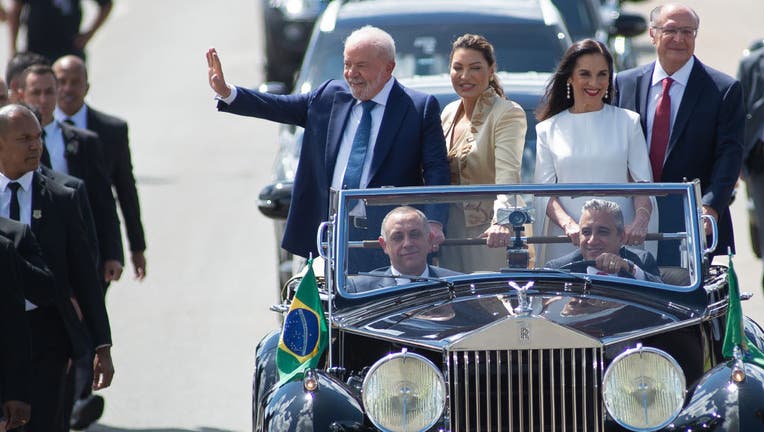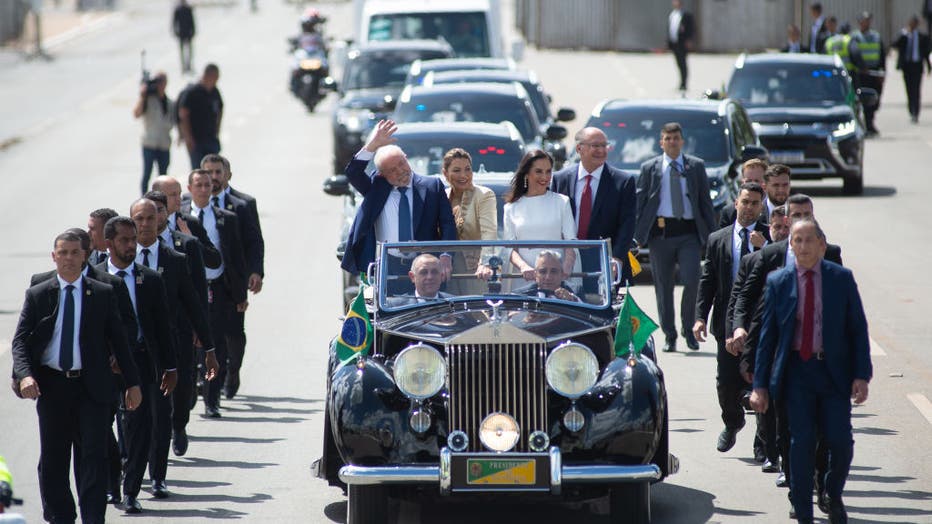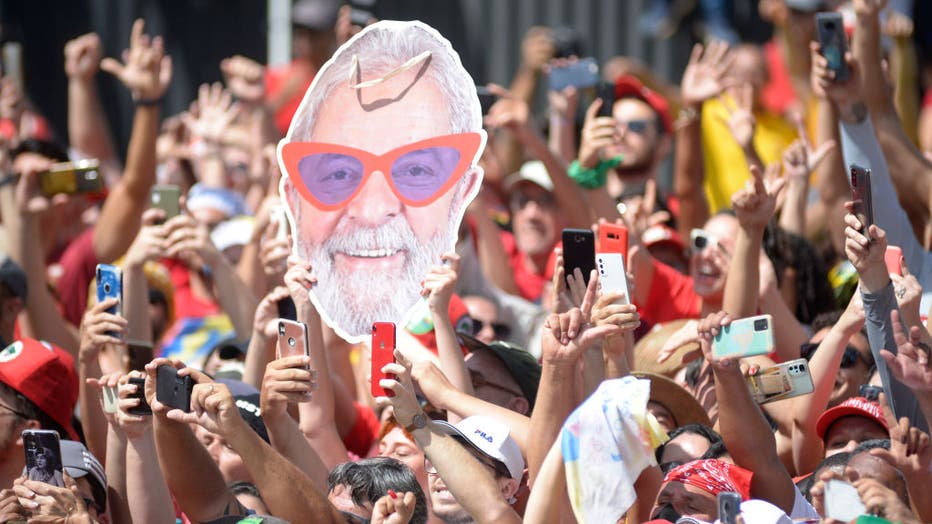Brazil's Lula sworn in as president amid a polarized country

BRASILIA, BRAZIL - JANUARY 01: (EDITOR'S NOTE: Alternate crop) President-elect of Brazil Luiz Inacio Lula da Silva waves to supporters along his wife Rosangela da Silva, Vice-President-elect Geraldo Alckmin and his wife Maria Lucia Ribeiro Alckmin as
BRASILIA, Brazil (AP) - Brazil’s Luiz Inácio Lula da Silva was sworn in as president on Sunday, assuming office for the third time after thwarting far-right incumbent Jair Bolsonaro’s reelection bid.
His return to power marks the culmination of a political comeback that is both thrilling supporters and enraging opponents in a fiercely polarized nation.
"Our message to Brazil is one of hope and reconstruction," Lula said in a speech in Congress’ Lower House after signing the document that formally instates him as president. "The great edifice of rights, sovereignty and development that this nation built has been systematically demolished in recent years. And to re-erect this edifice, we are going to direct all our efforts."
RELATED: College student solves ‘revolutionary’ 2,500-year-old language puzzle
Sunday afternoon in Brasilia’s main esplanade, the party was on. Tens of thousands of supporters decked out in the red of Lula’s Workers’ Party cheered after his swearing in. They also celebrated when the president said he would send a report about the Bolsonaro presidency to authorities that could investigate the far-right leader based on their findings.
Lula’s presidency is unlikely to be like his previous two mandates, coming after the tightest presidential race in more than three decades in Brazil and resistance to his taking office by some of his opponents, political analysts say.
The leftist defeated Bolsonaro in the Oct. 30 vote by less than 2 percentage points. For months, Bolsonaro had sown doubts about the reliability of Brazil’s electronic vote and his loyal supporters were loath to accept the loss.

BRASILIA, BRAZIL - JANUARY 01: President-elect of Brazil Luiz Inacio Lula da Silva waves to supporters along his wife Rosangela da Silva, Vice-President-elect Geraldo Alckmin and his wife Maria Lucia Ribeiro Alckmin as they head towards the National
Many have gathered outside military barracks since, questioning results and pleading with the armed forces to prevent Lula from taking office.
His most die-hard backers resorted to what some authorities and incoming members of Lula’s administration labeled acts of "terrorism" – something the country had not seen since the early 1980s, and which has prompted security concerns about inauguration day events.
"In 2003, the ceremony was very beautiful. There wasn’t this bad, heavy climate," said Carlos Melo, a political science professor at Insper University in Sao Paulo, referring to the year Lula first took office. "Today, it’s a climate of terror."
RELATED: World population projected to hit 7.9 billion on New Year’s Day
Lula has made it his mission to heal the divided nation. But he will have to do so while navigating more challenging economic conditions than he enjoyed in his first two terms, when the global commodities boom proved a windfall for Brazil.
At the time, his administration’s flagship welfare program helped lift tens of millions of impoverished people into the middle class. Many Brazilians traveled abroad for the first time. He left office with a personal approval rating of 83%.
In the intervening years, Brazil’s economy plunged into two deep recessions — first, during the tenure of his handpicked successor, and then during the pandemic — and ordinary Brazilians suffered greatly.
Lula has said his priorities are fighting poverty, and investing in education and health. He has also said he will bring illegal deforestation of the Amazon to a halt. He sought support from political moderates to form a broad front and defeat Bolsonaro, then tapped some of them to serve in his Cabinet.

BRASILIA, BRAZIL - JANUARY 01: Supporters greet Luiz Inácio Lula Da Silva as he heads for the National Congress for the presidential inauguration ceremony on January 01, 2023 in Brasilia, Brazil. At the age of 77 and after having spent 580 days in ja
Claúdio Arantes, a 68-year-old pensioner, carried an old Lula campaign flag on his way to the esplanade. The lifelong Lula supporter attended his 2003 inauguration, and agreed that this time feels different.
"Back then, he could talk about Brazil being united. Now it is divided and won’t heal soon," Arantes said. "I trust his intelligence to make this national unity administration work so we never have a Bolsonaro again."
Given the nation’s political fault lines, it is highly unlikely Lula ever reattains the popularity he once enjoyed, or even sees his approval rating rise above 50%, said Maurício Santoro, a political science professor at Rio de Janeiro’s State University.
RELATED: Massive fire at Cambodia hotel casino kills at least 19, officials say
Furthermore, Santoro said, the credibility of Lula and his Workers’ Party were assailed by a sprawling corruption investigation. Party officials were jailed, including Lula -- until his convictions were annulled on procedural grounds. The Supreme Court then ruled that the judge presiding over the case had colluded with prosecutors to secure a conviction.
Lula and his supporters have maintained he was railroaded. Others were willing to look past possible malfeasance as a means to unseat Bolsonaro and bring the nation back together.
But Bolsonaro’s backers refuse to accept someone they view as a criminal returning to the highest office. And with tensions running hot, a series of events has prompted fear that violence could erupt on inauguration day.
On Dec. 12, dozens of people tried to invade a federal police building in Brasilia, and burned cars and buses in other areas of the city. Then on Christmas Eve, police arrested a 54-year-old man who admitted to making a bomb that was found on a fuel truck headed to Brasilia’s airport.
He had been camped outside Brasilia’s army headquarters with hundreds of other Bolsonaro supporters since Nov. 12. He told police he was ready for war against communism, and planned the attack with people he had met at the protests, according to excerpts of his deposition released by local media. The next day, police found explosive devices and several bulletproof vests in a forested area on the federal district’s outskirts.
Lula’s incoming Justice Minister, Flávio Dino, this week called for federal authorities to put an end to the "antidemocratic" protests, calling them "incubators of terrorists."
In response to a request from Lula’s team, the current justice minister authorized deployment of the national guard until Jan. 2, and Supreme Court justice Alexandre de Moraes banned people from carrying firearms in Brasilia during these days.
"This is the fruit of political polarization, of political extremism," said Nara Pavão, who teaches political science at the Federal University of Pernambuco. Pavão stressed that Bolsonaro, who mostly vanished from the political scene since he lost his reelection bid, was slow to disavow recent incidents.
"His silence is strategic: Bolsonaro needs to keep Bolsonarismo alive," Pavão said.
Bolsonaro finally condemned the bomb plot in a Dec. 30 farewell address on social media, hours before flying to the U.S.. His absence on inauguration day will mark a break with tradition and it remains unclear who, instead of him, will hand over the presidential sash to Lula at the presidential palace.
Lawyer Eduardo Coutinho will be there. He bought a flight to Brasilia as a Christmas present to himself.
"I wish I were here when Bolsonaro’s plane took off, that is the only thing that makes me almost as happy as tomorrow’s event," Coutinho, 28, said after singing Lula campaign jingles on the plane. "I’m not usually so over-the-top, but we need to let it out and I came here just to do that. Brazil needs this to move on."
AP writer Diane Jeantet contributed from Rio de Janeiro.

